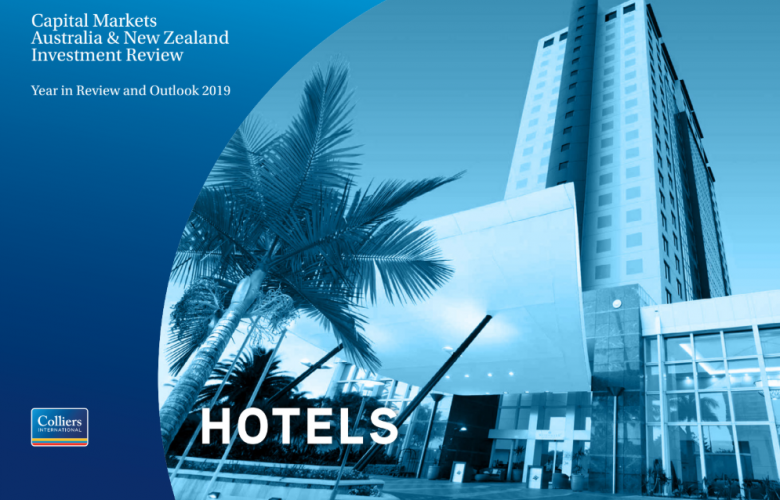"Australia’s investment-grade hotel rooms now worth $56 billion" - Colliers International
Contact
"Australia’s investment-grade hotel rooms now worth $56 billion" - Colliers International
Australia’s booming hotel market now comprises around 145,000 ‘investment grade’ rooms worth an estimated $56billion, according to new Colliers International research.
Colliers International’s new Capital Markets Hotels Investment Review reports the Australian hotel investment market has expanded considerably over the past eight years, with the development of more than 27,000 new accommodation rooms and a notable broadening of the capital base.
“Hotel values have also increased considerably in some markets,” Gus Moors, Colliers International Head of Hotels, said. “We estimate there are now around 145,000 ‘investment grade’* accommodation rooms across Australia with an estimated sector value of $56 billion.” Tourism was made a national investment priority by the Australian Government in 2013.
This represents an average price per key of $386,000 with the overall result skewed upwards by the premium pricing of rooms in Sydney and Melbourne.
“With transaction volumes having averaged around $1.6 billion each year over the past decade, annual deal flow accounts for only 3.0% of the total accommodation stock,” Mr Moors said. “ This suggests a relatively illiquid market, in part due to inter-generational owners, mostly from Asia, and a high proportion of strata-titled stock. However current ownership trends point to an uptick in activity.
See also: Travelodge Adelaide hotel for sale - Karen Wales, Gus Moors, Colliers International
“As accommodation development increased in recent years, a higher proportion of rooms are now held by developers. Many of these groups are likely to look to exit over the next few years to recycle capital into other projects. This should see deal flow increase.”
46 hotels opened in the ten major accommodation markets 2018, adding 6,763 rooms to accommodation supply.
“Another factor is the increased activity of domestic and global investment funds in 2018. Given the total return focus from this type of investor, we anticipate greater transaction activity in the medium term, as these groups seek to crystallise their investment by selling the assets.” Karen Wales, Colliers International Director of Hotels, said.
“Over the past twenty years, the Australian hotel investment landscape has at times been characterised by strong capital inflows, notably from Asia, as these investors have looked to take advantage of counter cyclical hotel or property markets, as well as currency fluctuations.
“Asian investment has increased considerably over the last cycle to now account for around $18billion of accommodation stock. These investors are typically inter-generational holders of assets, which can be both publicly or privately held.
See also: Manly beachfront pub 'Hotel Steyne' for sale - Gus Moors, Colliers International
“Interestingly, however, domestic and regional hotel and serviced apartment operators now represent the largest owners of Australian accommodation real estate, having amassed almost $9billion of real estate since the global operating companies started to sell down assets and adopt asset-light strategies.
“As a real estate asset class, hotel properties have historically been characterised as offering a higher return in exchange for a higher risk profile. This more ‘intensive’ return profile has meant that hotel investment has traditionally been the domain of the nimble and more risk accepting private investor.”
Colliers International expects Australia’s tourism market will continue to expand, with spending by domestic and international visitors at record levels and with both recording strong growth at levels well above inflation.
“As the economic and political environment shifts, the globalisation of Australian hotel real estate will continue. Overseas investment will remain key given the weight of capital and strong performance of the sector,” Mr Moors said.
“The diversity of buyer types, from institutions to sovereign wealth, private equity, developers and private individuals is also deeper than ever before. Each of these groups have their own specific dynamics including cost of capital, hurdle return rates, hold periods and sector preferences. This can make for a deep and competitive market.
“Against this competitive backdrop, deal flow is expected to increase as owners respond to changing market conditions, particularly in markets with significant new supply.”
Ms Wales said: “There are more than 6,600 new rooms slated to open in the ten major accommodation markets in 2019 with Melbourne, Perth and to a lesser extent Sydney, expected to see the bulk of these new rooms. If they have not already done so, existing owners will need to consider expediting the renovation cycle to compete with new accommodation supply.
Click here to download Colliers International’s new Capital Markets Hotels Investment Review.
*Colliers International defines investment grade stock as 2 to 5-star hotels, motels and serviced apartments (including strata) with more than 75 rooms, as well as chain-operated product and luxury boutique properties with less than 50 rooms.
See other research on the Australian hotel market:
Australian hotel sales total $1.8 billion in 2018 - Colliers International Report
CBRE release their 2019 hotel market outlook research report
Tighter yields and limited stock lead pub buyers to broaden their horizons - CBRE Hotels







